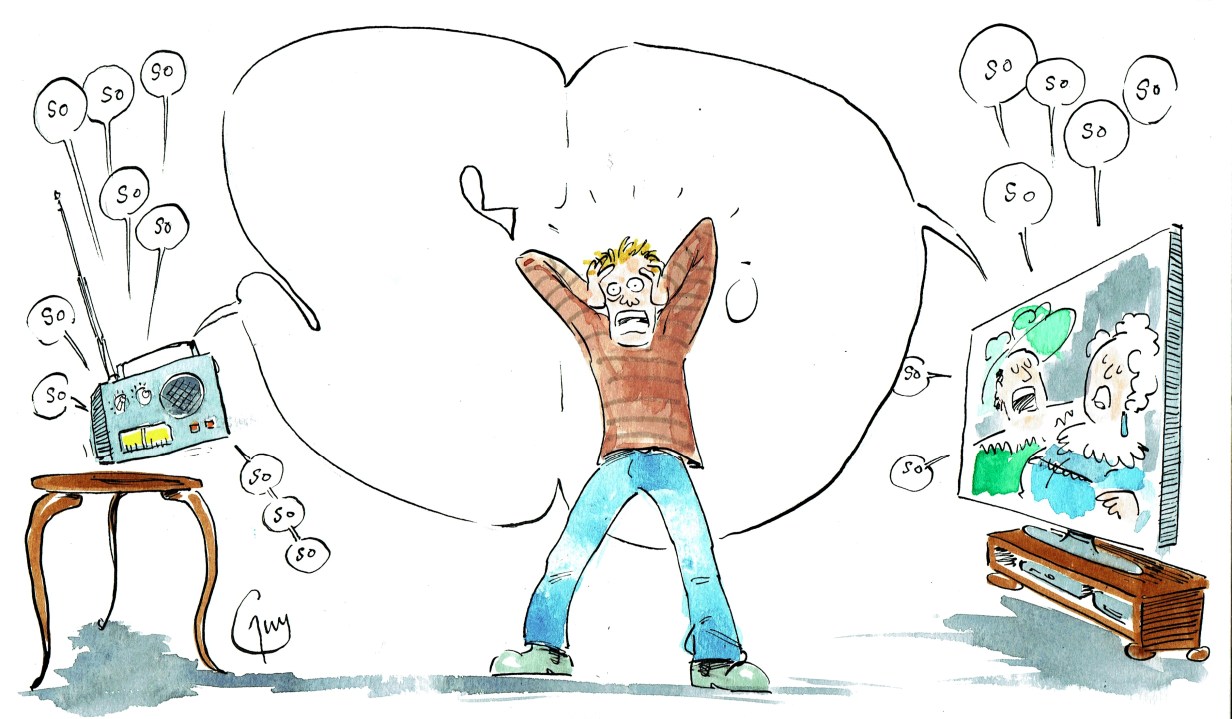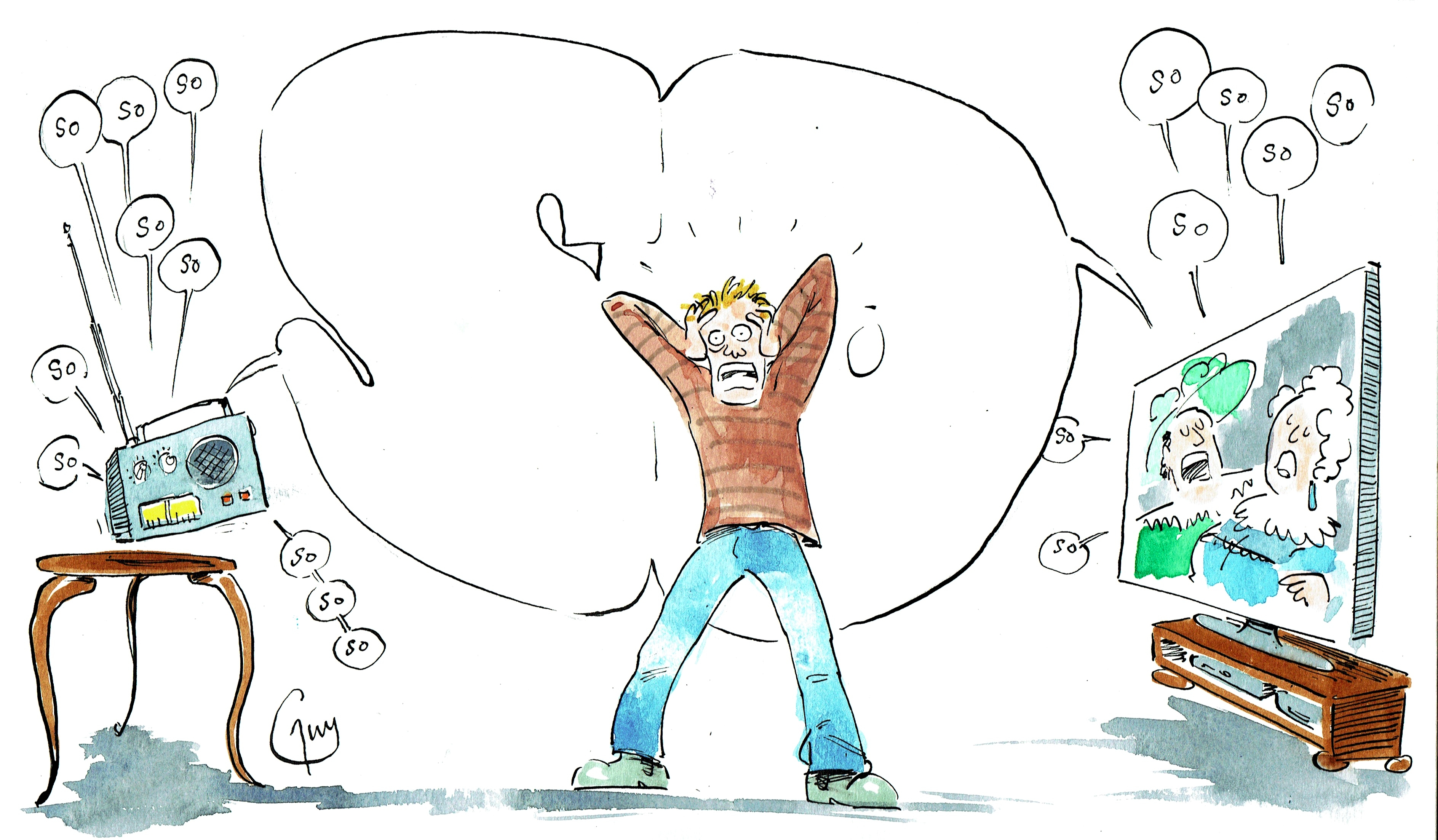So, a question for you. Are you bothered by the fact that you hear the word so, quite so often? Does ‘so’ grate on you?
It grates on me. A lot. Every time I hear it I shudder, which makes certain television channels frankly hazardous.
In fact, I’ve reached my absolute ‘so’ saturation point. It happened the other morning when my son, who is just five, walked into the sitting room and announced portentously: ‘So, the question is…’
I didn’t catch the question because I was wracking my brain as to where he had come up with that form of words. And then it dawned on me…
Over the next half an hour I must have caught myself either saying ‘so’ or very nearly doing so, about half a dozen times.
It has rapidly become the verbal brain burp of the epoch, heralding the arrival of a new thought from a speaker. Indeed, its ubiquity is so supreme that I fear it will drive many perfectly better words to the point of extinction.
Forget the rise of China. We need to contain the rise of ‘so’
So, I was thinking…
So, how about…
So did you see…
And so it goes on. Unfortunately it’s excessively contagious, in much the same way as ‘like’ was in the nineties. Forget the rise of China. We need to contain the rise of ‘so’.
And I think I have found the source of the ‘so’ malaise: Bridgerton – the outlandish ‘regency’ romp with absurd, 21st century dialogue. Scarcely minutes into the first episode Lady Cowper is pronouncing a new thought: ‘So tell me about this cousin…’ she purrs.
The best ‘so’ of all comes in the second episode when Lady Danbury – played deliciously by the Adjoa Andoh – stalks into a flashback, and declares with an emphasis that would have shamed Edith Evans’s Lady Bracknell: ‘So… You are not dead, after all!’
It’s not just Bridgerton that’s spreading the ‘so’ virus. The fourth series of The Crown is loaded with them. In a stalking scene in the second episode where the Duke of Edinburgh takes a Bambi-eyed Diana off to shoot an injured stag (what a metaphor!) he has makes two so announcements both of the vacuous mental burp variety: ‘So I suppose I must have seen you growing up on the estate at Sandringham…’ he says, followed by ‘So is that what you do all day?’ Then not four minutes’ later, when the they return triumphant with the stag at Balmoral, the Duke opens with: ‘So we found him, yes.’
Unlike the rise of ‘like’, ‘so’ is needling its way into written English. ‘So who are you again? Boris Johnson meets the new MP for Hartlepool’ shouted a headline in the Guardian just the other day.
The sad fact is that all this stuff we’ve been glued to on Netflix during these long months of lockdown is contributing to so’s remorseless rise.
When it is used correctly, ‘so’ is extremely useful as an intensifier to modify adverbs. Naturally enough, it also has its place when used as a stand-in for a verb to avoid unwieldly repetition (‘Will the Spectator arrive today? I do hope so.’). In a similar way, it’s excellent for responding to certain types of question: Off to the pub to do some social distancing? Great, so am I!
Finally, it’s also perfect at being what grammarians call a subordinating conjunction where there’s an implied consequence (eg: ‘I’ve been a pedant since I was born, so I can’t help myself.’)
But where we categorically don’t need it is as a meaningless and irritating adornment at the start of every new pronouncement or thought. Why not simply cut to the chase?
Imagine Richard, Duke of Gloucester, limping on stage in Richard III to utter the immortal line: ‘So… now is the winter of our discontent…’ Or you see a glorious, gleaming chorus of daffodils, and in your mind you sing: ‘So… I wondered lonely as a cloud/ That floats on high o’er vale and hills.’
In George Orwell’s famous essay of 1946, Politics and the English Language, he wrote a call to arms to defend our language against unthinking tides of change. ‘Most people who bother with the matter at all would admit that the English language is in a bad way but it is generally assumed that we cannot by conscious action do anything about it,’ he began. ‘It follows that any struggle against the abuse of language is a sentimental archaism, like preferring candles to electric light or hansom cabs to aeroplanes.’
But it’s not. Language, he makes clear, is a precision tool that we must maintain for our benefit. Moreover if you don’t look after it, things just go from bad to worse: ‘an effect may become a cause. A man may take to drink because he feels himself to be a failure, and then fail all the more completely because he drinks.’
In other words, ‘so’ matters. Eradicating its improper use is part of taking care of our language – the vehicle through which we are best able to make our thoughts known to the world.
How about it, then? Will you help halt this pandemic of so’s? ‘Let the meaning choose the word and not the other way around,’ Orwell wrote. Quite so.







Comments